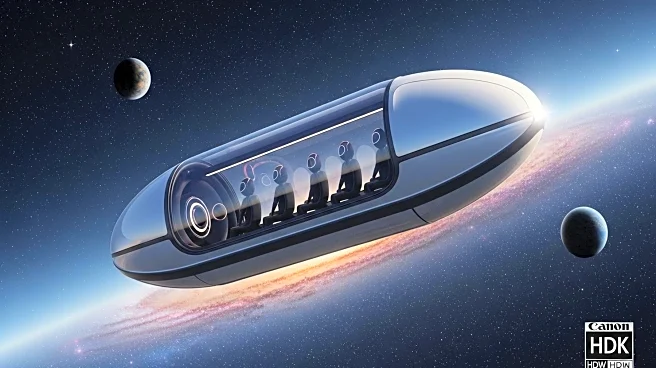What is the story about?
What's Happening?
Blue Origin, founded by Amazon's Jeff Bezos, is set to launch its 15th space tourism mission, designated NS-36, on October 8. The launch will occur from Blue Origin's West Texas site, with liftoff scheduled for 9:40 a.m. ET. This mission marks the 36th flight of the New Shepard vehicle, a reusable rocket-capsule system. Of these flights, 21 have been uncrewed research missions, while NS-36 will be the 15th to carry passengers. The six individuals on board include Jeff Elgin, Danna Karagussova, Clint Kelly III, Aaron Newman, Vitalii Ostrovsky, and one anonymous passenger. Clint Kelly III is a veteran of spaceflight, having previously flown on Blue Origin's NS-22 mission. The flight will last approximately 10 to 12 minutes, allowing passengers to experience weightlessness and cross the Kármán line, the recognized boundary of outer space.
Why It's Important?
The launch of Blue Origin's NS-36 mission underscores the growing interest and investment in space tourism. As more private companies like Blue Origin continue to develop and execute space tourism missions, the industry is poised for significant growth. This expansion could lead to increased accessibility to space travel for non-professional astronauts, potentially transforming the way people perceive and interact with space. The mission also highlights the technological advancements in reusable rocket systems, which are crucial for reducing costs and increasing the frequency of space travel. The involvement of diverse passengers, including entrepreneurs and researchers, reflects the broadening appeal and potential applications of space tourism beyond mere recreation.
What's Next?
Following the NS-36 mission, Blue Origin is likely to continue expanding its space tourism operations, potentially increasing the frequency of flights and the number of passengers per mission. As the company refines its technology and operations, it may also explore new destinations or experiences in space tourism. The success of these missions could encourage other companies to enter the market, fostering competition and innovation. Additionally, regulatory bodies may need to adapt to the growing space tourism industry, ensuring safety standards and addressing potential environmental impacts. The continued development of space tourism could also stimulate interest in related fields, such as space research and technology development.
Beyond the Headlines
The rise of space tourism raises ethical and environmental questions, such as the carbon footprint of frequent launches and the implications of space travel accessibility. As the industry grows, it may face scrutiny regarding its environmental impact and the equitable distribution of opportunities for space travel. Furthermore, the commercialization of space could lead to debates about the ownership and use of extraterrestrial resources. These considerations may influence public policy and international agreements related to space exploration and utilization.

















